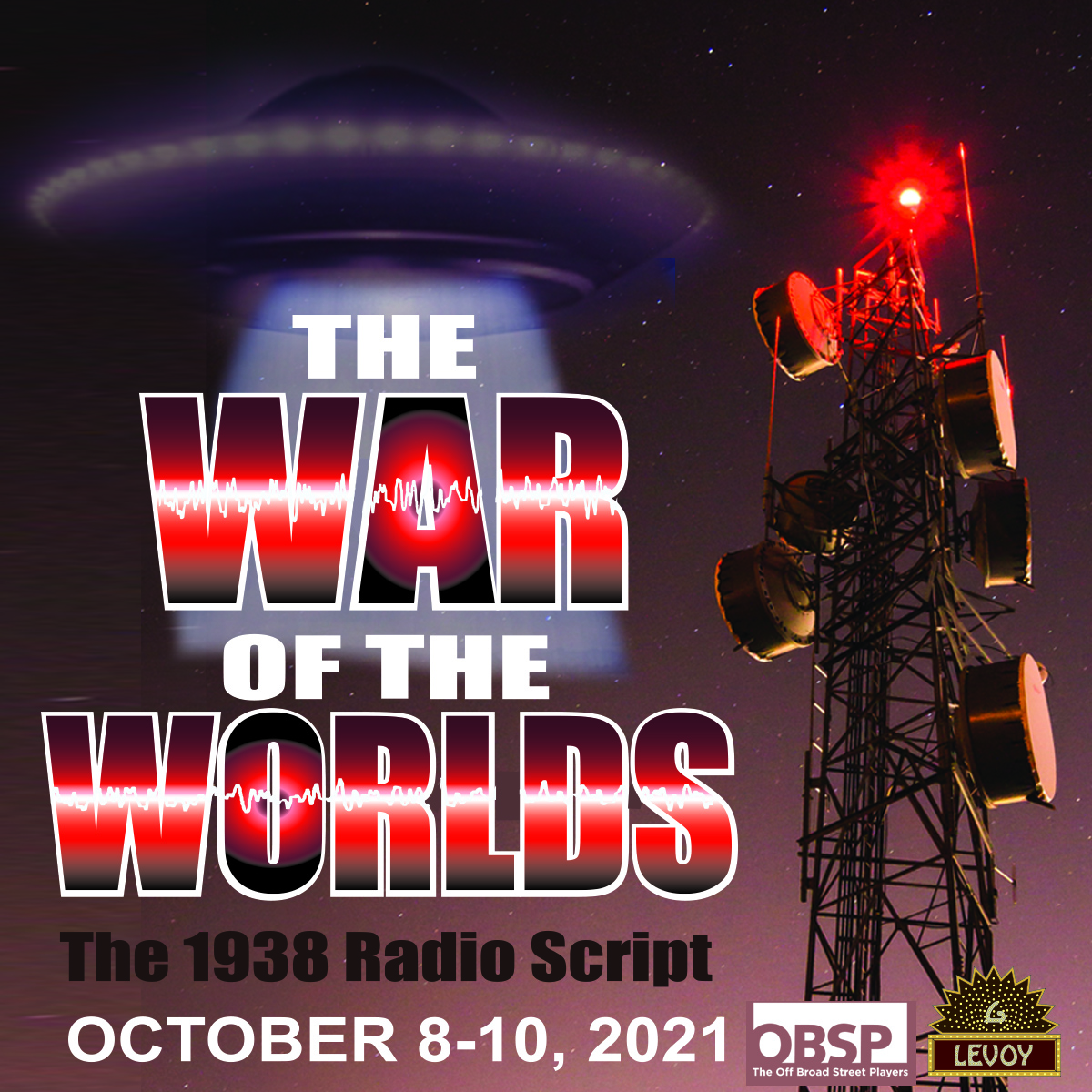

From Arts & Crafts to Food & Wine and Fun for the Kids, there’s a world of great events, festivals, fairs and fitness events in New Jersey’s Heartland. Here is a listing of all of the upcoming events.


October 8 | 10:00 am
The War of the Worlds (1938 radio drama)
Friday, October 8, 2021 @ 8 PM
Saturday, October 9, 2021 @ 2 PM
Saturday, October 9, 2021 @ 8 PM
Sunday, October 10, 2021 @ 3 PM
If you have any conflicts or questions please contact the box office at 856-327-6400 or email info@levoy.net.***
Lobby Doors: 60min prior to each performance.
Seating: 30min prior to each performance.
Runtime: TBD
“The War of the Worlds” is an episode of the American radio drama anthology series The Mercury Theatre on the Air directed and narrated by actor and future filmmaker Orson Welles as an adaptation of H. G. Wells’s novel The War of the Worlds (1898). It was performed and broadcast live as a Halloween episode at 8 p.m. on Sunday, October 30, 1938, over the Columbia Broadcasting System radio network. The episode became famous for allegedly causing panic among its listening audience, though the scale of panic is disputed, as the program had relatively few listeners.
The one-hour program began with the theme music for the Mercury Theatre on the Air and an announcement that the evening’s show was an adaptation of The War of the Worlds. Orson Welles then read a prologue which was closely based on the opening of H. G. Wells’ novel modified slightly to move the story’s setting to 1939. For about the next twenty minutes, the broadcast was presented as a typical evening of radio programming being interrupted by a series of news bulletins. The first few news flashes occur during a presentation of “live” music and describe a series of odd explosions observed on Mars, followed by a seemingly unrelated report of an unusual object falling on a farm in Grover’s Mill, New Jersey. The musical program returns briefly before being interrupted by a live report from Grover’s Mill, where police officials and a crowd of curious onlookers have surrounded the strange cylindrical object that fell from the sky. The situation escalates when Martians emerge from the cylinder and attack using a heat-ray, which the panicked reporter at the scene describes until his audio feed abruptly goes dead. This is followed by a rapid series of increasingly alarming news updates detailing a devastating alien invasion taking place around the country and the futile efforts of the U.S. military to stop it. The first portion of the show climaxes with another live report from a Manhattan rooftop as giant Martian war machines release clouds of poisonous smoke across New York City. The reporter mentions in passing that Martian cylinders have landed all over the country as he describes desperate New Yorkers fleeing and “dropping like flies”, the smoke inexorably approaching his location. Eventually he coughs and falls silent, and a lone ham radio operator is heard mournfully calling “Is there anyone on the air? Isn’t there… anyone?” with no response. Only then did the program take its first break, a full thirty-eight minutes after Welles’s introduction.
The second half of the show shifts to a conventional radio drama format which follows a survivor (played by Welles) dealing with the aftermath of the invasion and the ongoing Martian occupation of Earth. The final segment lasts for about sixteen minutes, and as in the original novel, it concludes with the revelation that the Martians have been defeated by microbes rather than by humans. The broadcast ends with a brief “out of character” announcement by Welles in which he cheerfully compares the show to “dressing up in a sheet, jumping out of a bush and saying ‘Boo!’”
Welles’s “War of the Worlds” broadcast has become famous for supposedly tricking some of its listeners into believing that a Martian invasion was actually taking place due to the “breaking news” style of storytelling employed in the first half of the show. The illusion of realism was furthered because the Mercury Theatre on the Air was a sustaining program without commercial interruptions; the first break in the drama came after Martian war machines were described as devastating New York City. Popular legend holds that some of the radio audience may have been listening to The Chase and Sanborn Hour with Edgar Bergen and tuned in to “The War of the Worlds” during a musical interlude, thereby missing the clear introduction indicating that the show was a work of science fiction. However, contemporary research suggests that this happened only in rare instances.
In the days after the adaptation, widespread outrage was expressed in the media. The program’s news-bulletin format was described as deceptive by some newspapers and public figures, leading to an outcry against the broadcasters and calls for regulation by the Federal Communications Commission. Nevertheless, the episode secured Welles’s fame as a dramatist.

© 2025 NJ Heartland. All rights reserved. website by masterpieceadvertising.com | Privacy Policy
Comments are closed